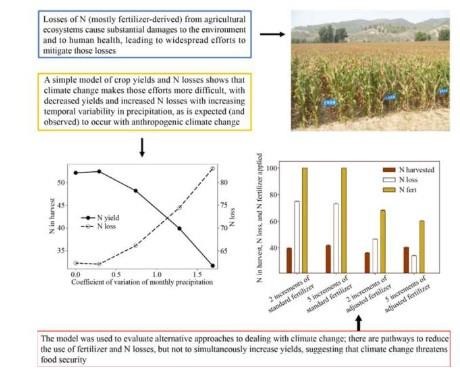
Frontiers of Agricultural Science and Engineering (2022).
Climate change (e.g., global warming) is intensifying the global water cycle and the temporal variation of precipitation has increased significantly. The distribution of precipitation is more uneven over time, and drought and flood events occurred more frequently. This unstable variability in precipitation is particularly negative for crop growth.
On the one hand, temporal variation in precipitation will directly affect the timing of crop fertilizer applications, further limiting the matching of fertilizer supply and crop demand. On the other hand, the increased temporal variability of precipitation leads to an asynchronous between N supply and N demand, which indirectly leads to more reactive nitrogen losses (including leaching loss, gaseous emissions, etc.), thus causing water pollution, greenhouse gas emissions, air pollution and other ecological environment and human health effects.
Prof. Peter M. Vitousek from Stanford University and his team simulated crop productivity based on soil moisture and temperature, and biologically available N and P from all sources (fertilizer, atmospheric deposition, and mineralization of N and P from soil organic N and P), to assess how temporal variation in precipitation affects crop yield and nitrogen losses.
The model results show that the appropriate amount of fertilizer application (100 and 20 units of N and P, respectively) and the appropriate timing of addition (two-increment to the crop in the growing period, and the timing of application is closer to the growing period, the more significant the effect of increasing yield and reducing Nr emissions) can result in a higher recovery of N in harvested material of 53.6 and a lower N loss of 60.8, which is a recommended best practice for many field crops.
The increased variability of precipitation has the potential to bring extreme precipitation and a more uneven distribution of water resources, with various adverse effects on agricultural production. It was found in this study, increases in temporal variation in precipitation caused declining yields, progressively larger losses of reactive N. Such losses are likely to be particularly important for P, since the relative immobility of P causes large pools of fertilizer-derived P to accumulate in surface soils, where they are vulnerable to losses via runoff and soil erosion.
Global temporal variations in precipitation will be more dramatic with anthropogenic climate change, which will further reduce yields and increase nitrogen losses. The authors and their team hope to explore solutions that could address this climate risk. However, adjusting fertilizer application amounts (~30%) depending on soil moisture content will reduce reactive N losses (~50%) but does not increase crop yields.
Click here to see more...